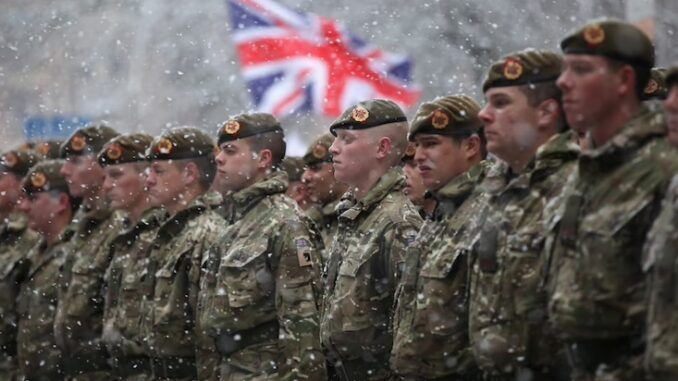
WEF Young Global Leader Grant Shapps has announced plans to deploy over 20,000 British military troops to the Russian border in anticipation for World War 3.

Shapps, the British Defence Secretary and WEF puppet, announced on Monday that the post-Cold War “peace dividend” is at an end.

BYPASS THE CENSORS
Sign up to get unfiltered news delivered straight to your inbox.
You can unsubscribe any time. By subscribing you agree to our Terms of Use
According to Shapps, “battle lines are being redrawn” and the world must prepare to enter a period of high-stakes conflict.
Yahoo.com reports: It will be the largest deployment of British land forces to Nato since the height of the Cold War in 1984, a year before Mikhail Gorbachev became Soviet leader.
This comes after Rishi Sunak announced that Britain’s military funding to Ukraine would be increased to £2.5 billion in the coming year and the Foreign Secretary warned of the growing threat from Iran, which is funding terrorists such as Hamas and the Houthis who have been attacking ships in the Red Sea.
The “peace dividend” refers to the period after the collapse of the Soviet Union when Western countries were able to reduce spending on defence.
Warning his audience that this period of history was over, Mr Shapps will say: “We are in a new era and we must be prepared to deter our enemies, prepared to lead our allies and prepared to defend our nation whenever the call comes.
“Today our adversaries are busily rebuilding their barriers, old enemies are reanimated, battle lines are being redrawn, the tanks are literally on Ukraine’s lawn and the foundations of the world order are being shaken to their core. We stand at a crossroads.”
Mr Shapps’ words come at a time when the size of the British Armed Forces has fallen to a record low.
Figures from last month show there were 184,865 service personnel in October, including just 75,983 regular soldiers. Both these totals were down 4 per cent on the previous year.
Last week, it emerged that the Royal Navy has so few sailors it has had to decommission two warships to staff a new class of frigates.
Lord Cameron said it was “hard to think of a time” when there had been so much “insecurity” in the world and said the UK would strike again in Yemen if necessary. “The lights are absolutely flashing red on the global dashboard,” he said.
At his Lancaster House speech, Mr Shapps will say that Britain’s contribution to the Steadfast Defender exercise will provide “vital reassurance against the Putin menace”.
The war games come after ministers announced a further £2.5 billion support package to Ukraine and the RAF air strikes with the US on the Houthis in Yemen.
Mr Shapps will set out his vision for how the UK will deter threats, as allies remain concerned about the threat posed by Mr Putin as his war approaches its second year.
“I can announce today that the UK will be sending some 20,000 personnel to take part in one of Nato’s largest deployments since the end of the Cold War, exercise Steadfast Defender,” he will say.
“It will see our military joining forces with counterparts from 30 Nato countries, plus Sweden, providing vital reassurance against the Putin menace.”
Some 16,000 troops with tanks, artillery and helicopters will be deployed from the British Army across eastern Europe starting next month as part of the exercise. The drills will take place in Poland, the Baltic states and Germany.
The Royal Navy will deploy more than 2,000 sailors across eight warships and submarines, while more than 400 Royal Marines Commandos will be sent to the Arctic Circle.
The RAF will use F-35B Lightning attack aircraft and Poseidon P-8 surveillance aircraft.
Defence sources said that the exercise will prepare for the invasion of a member state by any aggressor, with the main threats being considered to be from Russia and from terrorism.
It comes as Rishi Sunak is set to make a statement to Parliament about the “limited and necessary” military action in Yemen and what further steps the UK will take.
British and US fighter jets dropped bombs on terrorist targets on Thursday night after the Houthis attacked a Royal Navy warship in the region.
Lord Cameron said: “Take a step back from this, it is hard to think of a time when there has been so much danger and insecurity and instability in the world.
“The lights are absolutely flashing red as it were on the global dashboard and what we need at that time is strong leadership and a clear plan, that is what we have with the Prime Minister and the team in place.
“If you don’t act against the Houthis in the Red Sea, you are going to see more attacks, they are effectively terrorist attacks, you will see more of that.”
The Foreign Secretary added: “There’s no doubt that the malign actor in the region who is behind these proxy groups is Iran. Iran backs Hamas, they back the Houthis.”
Making a connection
His remarks came as Sir Richard Dearlove, the former head of MI6, said the situation in Yemen was linked to the ongoing war between Israel and Hamas.
Ministers have tried to downplay suggestions that the situation in Gaza was responsible for increased attacks by Houthi rebels against Red Sea shipping.
But Sir Richard, who headed up the spy service from 1999-2004, said: “The problem is in the Middle East, in the Arab world, making that separation, particularly on the Arab street, is extremely difficult.
“But if one’s being rational in analysis I agree with David Cameron that freedom of navigation is a different issue from Gaza, but the Arab street doesn’t think that.”
He added: “Inevitably there’s a connection. They’re going to have an impact across the whole area.”